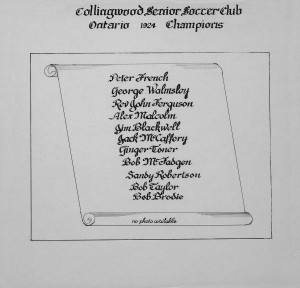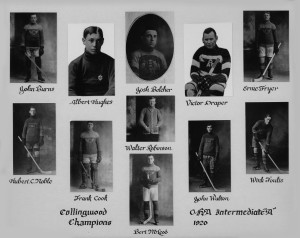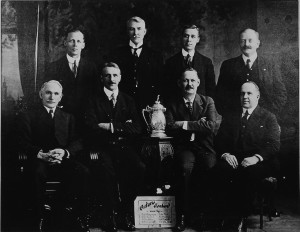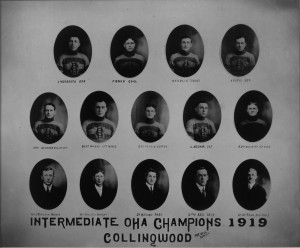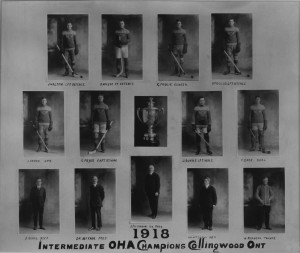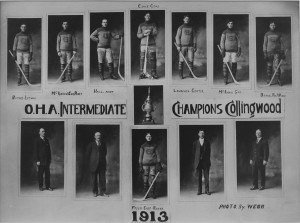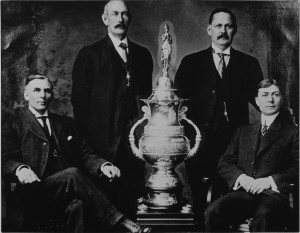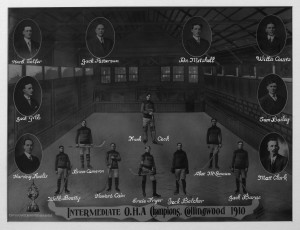Category Archives: 1900 – 1929
1920 – OHA Intermediate “A” Champions
1920 Ontario Curling Tankard Winners
1919 – OHA Intermediate Champions
1918 – OHA Intermediate Champions
1913 – OHA Intermediate Champions
1913 Sleeman Trophy – Tankard Champions
OHA Intermediate “A” Champions – 1910
ROY HEWSON
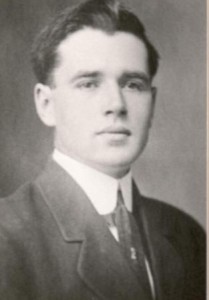 Professional foot racing was a booming sport throughout the Georgian Bay 70 years ago but few people know that Collingwood once claimed a professional distance runner of national reputation.
Professional foot racing was a booming sport throughout the Georgian Bay 70 years ago but few people know that Collingwood once claimed a professional distance runner of national reputation.
His name was Roy Hewson and for a decade between 1906 and 1916 he ruled supreme in races over distance between three and five miles.
He was the postmaster at Batteau Settlement, just south of Collingwood, for many years. Hence his nickname “The Batteau”.
No person heard of him as a runner until he casually entered the five-mile race in the annual Domination Day Celebration at Collingwood.
Dressed in street clothes, he literally walked away from the field of twenty better than average runners of that era.
He was only fifteen years old at the time and he did not take the sport too seriously until two Stayner backers persuaded him to take a crack at professional running.
In the spring of 1909, he gave up his amateur standing and entered a race over a seven-mile course from Duntroon to the old Globe Hotel in Collingwood. He lost that race to Ed Haverson of New Lowell.
Haverson was a seasoned runner with two big time wins at the Canadian National Exhibition to his credit. On April 25th, 1909, Hewson beat Haverson soundly for a purse of three hundred dollars and a two hundred dollar side bet. Collingwood sportsmen Joe Ganley and Paddy Stone won ten thousand dollars on the race.
The skinny kid from Batteau went home with a silver cup in his arms and five hundred dollars in his pocket. Hewson won a dozen more important races and repeated his victory over Haverson in Barrie.
Three years later he won the three-mile Canadian title in Toronto but interest in professional running had died out. The purse was only fifty dollars. The Batteau hung up his running shoes and went back to the post office. Twenty-nine years ago he collapsed and died outside on the street after attending a hockey match in the Collingwood Arena.
JAMES WOOLNER
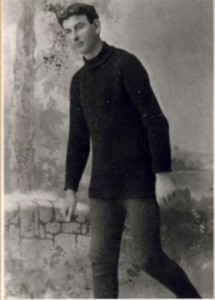 Captain Jim Woolner was born in Collingwood in 1878.
Captain Jim Woolner was born in Collingwood in 1878.
A Master of the steel blades at the turn of the century Captain Jim was a household word and every kid in the Georgian Bay district tried to emulate his style at one time or another.
He had his first pair of speed skates shortly after he had his first pair of boots and he was still skating the year he died in 1938.
For over two decades Jim beat every skater that cared to take up the challenge, and he did it with the confident ease that was his stock in trade.
Unfortunately, Woolner was never attached to an organized skating club, and, as a result, many of his best records are not officially recorded.
In his heyday, Captain Woolner defeated such great Canadian speed artists as Toronto’s Harley Davidson, the fiery Stubby Graham of Fergus, Canadian mile champion, Len Forrester of Fergus.
The crowning point of his career was his victory over Davidson in Collingwood’s old Pine Street Rink in March, 1900.
Davidson had beaten the best skaters of the era at the International Speed Carnival atMontrealand up until that time he had never even heard of Woolner. But Davidson accepted Jim’s challenge and the match race was staged for a cash prize of two thousand dollars-winner takes all.
As it turned out, the race was a walk away for Woolner and an embarrassing memory for the highly touted Davidson.
The following winter, Stubby Graham challenged Woolner to a race in Meaford. Graham was not only beaten by Jim but he was nosed out of second place by another Collingwood skater, Doug McLeod.
Tom Eck, a well known sports promoter and a former trainer of heavyweight boxing champion, Jack Johnson, arranged a five-mile race between Woolner and Len Forrester, Then the Canadian champion at five-mile distance.
With ten thousand dollars in bets riding on the outcome of the race, Captain Jim covered the five miles in fourteen minutes and forty seconds, and beat the Fergus star by four laps.
The gamblers refused to bet against him and limited their wagers to the number of laps Woolner would finish ahead of the runner-up.
He won 3 races in Toronto on one Saturday afternoon and was so far ahead in the last race he turned around and skated backwards a full lap from the finish line.
Two years later, the Captain’s great career came to an end under shady circumstances in a return match with Forrester in Fergus.
He won the first heat easily but fell and broke his leg half-way through the second heat. A quick check revealed that someone had laid a fine wire across the ice in Woolner’s Lane.
Jim Woolner never skated again in competition. He became one of the most colourful skippers on theGreat Lakes. Three weeks before his untimely death, he thrilled a big crowd at the annual Collingwood Ice Carnival at the Park Rink. When he made a few graceful turns around the ice and was given a standing ovation.
On March 15th, 1938, Captain Jim Woolner died in a motor crash on Paddy Dunn’s Hill, just north of Barrie. He was returning from a hockey game in Toronto. He was just fifty-seven.

